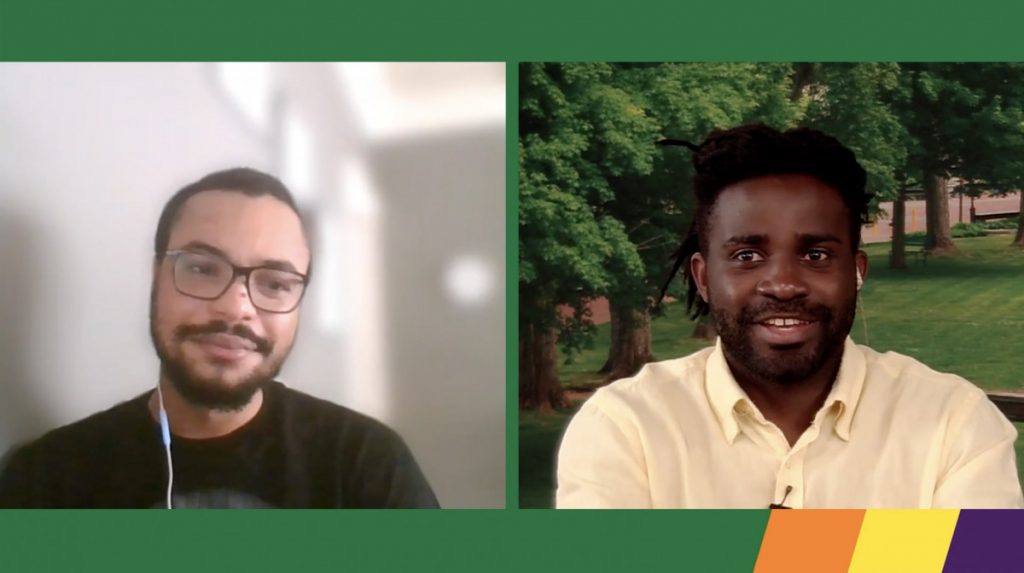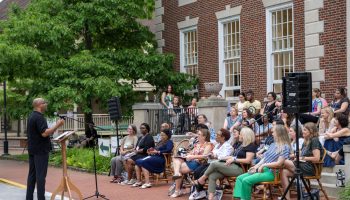SARAH VEST – STAFF WRITER

American poet Lucille Clifton once said that “one should wish to celebrate more than one wishes to be celebrated.” Enyeribe Ibegwam, the winner of the fourth annual Chautauqua Janus Prize, said that he was lucky to be able to spend last Friday at the winner’s ceremony “celebrating as well as being celebrated” and experiencing “double the delight.”
On Friday, July 30, Chautauqua Literary Arts celebrated the fourth annual winner of the Chautauqua Janus Prize on the CHQ Assembly Video Platform. The recording of the Winners’ Celebration is still available to view on demand. The prize is funded by Chautauquans Barbara and Twig Branch.
Sony Ton-Aime, the Michael I. Rudell Director of the Literary Arts, started the evening off with a description of what the Janus Prize judge looks for when selecting a piece of short fiction or nonfiction. The Chautauqua Janus Prize celebrates an emerging writer’s work for “daring, formal and aesthetic innovations that upset and reorder the reader’s imagination.”
The Janus Prize is named after the two-faced Roman god who looks to both the past and the future. The prize seeks to honor a writer with a command of craft that innovates the reader’s understanding of both.
According to Ton-Aime, Ibegwam’s winning piece — “After School Hours” — captures the essences of the price with a short story that features protagonists who are looking to the future as immigrants in a new country, while simultaneously reckoning with their past and their country of origin’s way of life.
“It is a timely and timeless story,” Ton-Aime said.
This year’s judge was Rion Amilcar Scott. He is the author of the story collection The World Doesn’t Require You, a finalist for the PEN/Jean Stein Book Award and winner of the 2020 Towson University Prize for Literature. His debut story collection, Insurrections (University Press of Kentucky, 2016), was awarded the 2017 PEN/Bingham Prize for Debut Fiction and the 2017 Hillsdale Award from the Fellowship of Southern Writers. His work has been published in places such as The New Yorker, The Kenyon Review, Crab Orchard Review, Best Small Fictions and The Rumpus. He has received fellowships from Bread Loaf Writers’ Conference, Kimbilio and the Colgate Writing Conference as well as a 2019 Maryland Individual Artist Award. Currently he teaches creative writing at the University of Maryland.
Scott said that “After School Hours” was one of the first pieces that he read when he was going through all the submissions and that it made him forget he was reading a story.
“The sentences just float and they flow in a river in such a rhythmic way that you’re placed within the story,” Scott said. “The other thing about the story was it has these echoes of ancient stories. It’s a coming of age story, but it’s also a ‘cast out of Paradise’ story, as old as Adam and Eve.”
Scott added that the story brought him back to his own youth, living as a part of an immigrant in the Washington D.C. area. He said that Ibegwam “captures beautifully and wonderfully and very truthfully” that experience.
The digital microphone was passed to Ibegwam, who told an anecdote from his childhood. He talked about how his father used to always tell him to “go outside and play.” He grew up in Lagos, Nigeria, a neighborhood where going outside meant seeing other people. Ibegwam said that, to tell the truth, “the lives of other people seemed much more enticing to (him) than (his own).”
He talked about neighbors who practiced religions where they wore flowing white gowns that confused his Roman Catholic brain, neighbors who had a monkey as a pet and a woman from Sri Lanka who did not want to be called “Auntie” like all the other women on the street, but wanted to be called “Mrs. B.” He said that this act of watching the world around him is what allowed him to develop his imagination and begin to see himself in the shoes of his neighbors.
He went on to turn this into a lesson of sorts about parenting, saying that the real difficulty faced by people, parents in particular, is that children are not allowed to go outside and play anymore. The reason, according to Ibegwam, is that there is a desire to shield children from “the sharp angularity of the world, such as the big bad wolf lurking in the bushes.”
He said people have to believe that allowing children to be on their own isn’t enough, that we shouldn’t stuff their faces with technology like cellphones and tablets, even in the aisles of grocery stores or sitting at the kitchen table.
“It’s as though if we do it well enough for long enough, that (children) will grow up without knowing that sometimes even ugly ducklings from Hans Christian Andersen’s stories just end up becoming ugly ducks,” Ibegwam said.
He argued that shielding them from difficulty is doing a disservice to today’s youth, and that if they were allowed to see some of the ugliness in the world, adults would be able to turn “sympathy into empathy” and create children who “will be unafraid to love to lose love, and to love again, to be unafraid to walk alone.”




